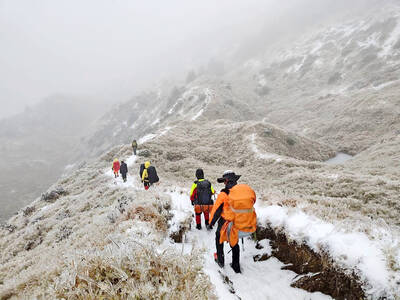Taiwan has not yet reached a point where it can export masks to diplomatic allies amid the COVID-19 pandemic, the Ministry of Foreign Affairs said yesterday, dismissing as misinformation online reports that it gave away masks to curry favor with a diplomatic ally.
“Taiwan provides med-ical aid to diplomatic allies based upon specific circumstances,” Minister of Foreign Affairs Joseph Wu (吳釗燮) said, adding that the supplements donated by Taiwan were all purchased locally in allied countries, in accordance with their needs.
“The time is not yet ripe” for Taiwan to export medical supplies, such as surgical masks, to diplomatic allies, until it is able to satisfy domestic demand, Wu said.
He was answering questions from reporters about reports that the ministry contravened the export ban by donating 100,000 masks to Paraguay, despite a domestic shortage.
The ministry on Saturday issued a statement rebutting the accusation, saying it had informed the authorities about the circulating misinformation.
Wu yesterday told a meeting of the legislature’s Foreign and National Defense Committee that the masks Taiwan provided to Paraguay were purchased in other Latin American countries at US$0.4 each and were not made in Taiwan.
However, restricted by the limited output of manufacturers in that region, Taiwan was able to give only 100,000 — instead of 1 million — masks to help the pandemic-hit ally, he said.
Wu added that Taiwan is facing a serious diplomatic challenge from China, which had contacted Paraguay and offered to donate masks.
Because of China’s suppression and poaching of allies, Taiwan has only 15 diplomatic allies, mostly in Latin America and the Caribbean.
Taiwan imposed a provisional ban on mask exports in late January after it reported the first confirmed case of novel coronavirus infection.
The ban, which was to last until Feb. 23, has been extended to April 30. The government has also requisitioned masks nationwide.
Lawmakers also asked Wu about Taiwan’s mask agreement with the US in their joint efforts to combat COVID-19.
Under the joint statement signed on March 18 by Wu and American Institute in Taiwan Director Brent Christensen, the US promised to reserve raw materials for 300,000 medical protective suits for Taiwan, while Taiwan agreed to provide 100,000 masks per week to the US when its production capacity has stabilized.
Wu confirmed that it is a formal “government-to-government” statement, although there are no formal diplomatic ties between the two nations.
As for when Taiwan would begin to supply the US with 100,000 masks per week, Wu said the two sides are still discussing the details.
Besides, the US has not yet decided when it would begin shipments of raw materials for 300,000 medical protective suits for Taiwan, Deputy Minister of Foreign Affairs Hsu Szu-chien (徐斯儉) said.
Taiwan needs 1 million medical protective suits and there are only two companies in the world — one in Japan and the other in the US — that produce key materials for the product, Vice Minister of Economic Affairs Wang Mei-hua (王美花) said.
Although a Taiwanese company produces medical-grade cloth for protective suits, its output can only satisfy 10 percent of domestic demand, Wang said.

Trips for more than 100,000 international and domestic air travelers could be disrupted as China launches a military exercise around Taiwan today, Taiwan’s Civil Aviation Administration (CAA) said yesterday. The exercise could affect nearly 900 flights scheduled to enter the Taipei Flight Information Region (FIR) during the exercise window, it added. A notice issued by the Chinese Civil Aviation Administration showed there would be seven temporary zones around the Taiwan Strait which would be used for live-fire exercises, lasting from 8am to 6pm today. All aircraft are prohibited from entering during exercise, it says. Taipei FIR has 14 international air routes and

The Ministry of National Defense (MND) today released images of the military tracking China’s People's Liberation Army (PLA) movements during the latest round of Chinese drills around Taiwan. The PLA began "Justice Mission 2025" drills today, carrying out live-fire drills, simulated strikes on land and maritime targets, and exercises to blockade the nation's main ports. The exercises are to continue tomorrow, with the PLA announcing sea and air space restrictions for five zones around Taiwan for 10 hours starting from 8:30am. The ministry today released images showing a Chinese J-16 fighter jet tracked by a F-16V Block 20 jet and the

Snow fell on Yushan (Jade Mountain, 玉山) yesterday morning as a continental cold air mass sent temperatures below freezing on Taiwan’s tallest peak, the Central Weather Administration (CWA) said. Snowflakes were seen on Yushan’s north peak from 6:28am to 6:38am, but they did not fully cover the ground and no accumulation was recorded, the CWA said. As of 7:42am, the lowest temperature recorded across Taiwan was minus-5.5°C at Yushan’s Fengkou observatory and minus-4.7°C at the Yushan observatory, CWA data showed. On Hehuanshan (合歡山) in Nantou County, a low of 1.3°C was recorded at 6:39pm, when ice pellets fell at Songsyue Lodge (松雪樓), a

NO SHAME IN RETREAT: Hikers should consider turning back if the weather turns bad or if they do not have sufficient equipment, the Taroko park headquarters said Two people died of hypothermia over the weekend while hiking on Hsuehshan (雪山), prompting park authorities to remind hikers to bring proper equipment and consider their physical condition before setting out in the cold weather. Temperatures dropped over the weekend, bringing snow to high altitudes in Shei-pa National Park. One hiker, surnamed Lin (林), who on Friday was traveling with a group of six along the Hsuehshan west ridge trail, lost consciousness due to hypothermia and died, the Shei-pa National Park Headquarters said. On Saturday, another hiker, surnamed Tien (田), in a group of five on the southeast of the west